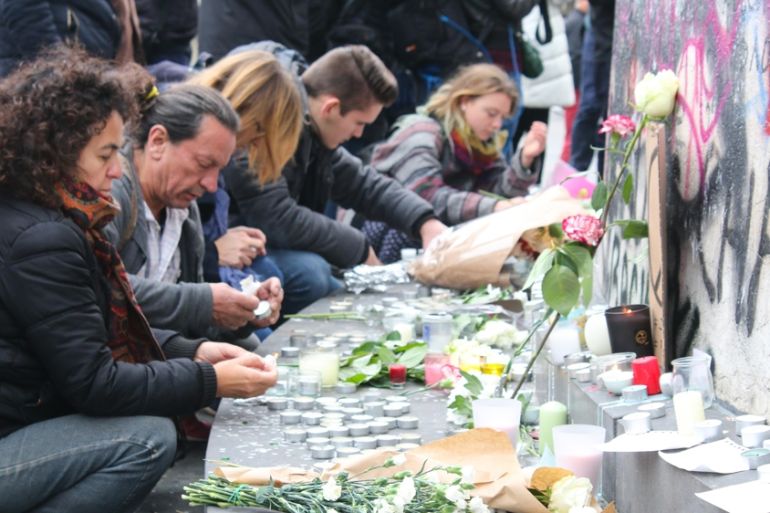A vision of chaos in Paris
Parisians from different walks of life reflect in the aftermath of the attacks on the French capital.

Paris, France – Umut Aydin, 30, is on his way to do laundry. Listening to music. It is what the Parisian would do on any ordinary day.
Except today isn’t an ordinary day and he is walking close to Oberkampf, a metro station a hundred metres from Le Bataclan, the concert venue where more than 70 people died on Friday.
Keep reading
list of 4 itemsMoscow theatre attack suspects show signs of beating in court
Four men showing signs of severe beating charged over Moscow concert attack
Russia mourns Moscow concert hall attack victims as death toll rises to 137
“I was planning to go to the cinema tonight – and I will go. You need to live your life,” he says.
Around him, many people walk quickly by. They all have their phones stuck to their ears and there seems to be only one topic of conversation: the deadliest attack in Europe since the 2004 Madrid bombings.
RELATED: #TerrorismHasNoReligion trends after Paris attacks
The series of coordinated attacks in locations across Paris has so far taken 129 lives.
|
|
| French president calls Paris attacks an act of war by ISIL |
The Islamic State of Iraq and the Levant (ISIL) has claimed responsibility. But, for the people of this city, there is still much that remains unknown, many questions that remain unanswered.
Some are buying white roses from the few flower shops that have opened. People hug in the street, with troubled expressions on their faces.
‘Could have been us’
“But do you realise it could have been us?” says a young woman to the person on the other end of the phone.
Less than 11 months ago, over the course of three days in January, attacks in the city left 17 people dead, beginning on January 7, at the offices of the satirical weekly newspaper, Charlie Hebdo.
What followed was a mood that has become known as “the spirit of January 11” – after the day when almost four million people gathered in towns and cities across France to march in an unprecedented display of solidarity.
![The latest Paris attacks came just 10 months after similar attacks, including on the Charlie Hebdo magazine's office [Yann Schreiber/Al Jazeera]](/wp-content/uploads/2015/11/1237fdd175454fcbb5720515e6e5c716_18.jpeg)
Seventeen-year-old friends Salomé and Marinelle live a few blocks away from Le Bataclan – and from the Charlie Hebdo offices. They watched the aftermath of Friday’s attacks from their window and recall seeing a woman with bloodied clothes and members of France’s GIGN, the special operations unit of the French armed forces.
After the attacks in January, they both attended the rally in Paris.
“Right now, we are shocked. It does not seem like it is reality. It seems too far from our day-to-day life to be true. But we go to those places. It touches us even more,” says Salomé.
A day after the attacks, the French authorities banned public demonstrations until November 19, fearing the risks posed by large gatherings of people.
Umut grew up in Istanbul. His parents warned him constantly about keeping safe in public places, he says. Still, he is shocked. He considers this to be an attack on a “life style”, he explains.
But he doesn’t feel compelled to go out onto the streets in some mass display of defiance just yet and says he understands the restrictions imposed by the authorities.
“If I was younger, maybe I would be frustrated. But right now, I understand the responsibility of the official powers. They are doing the right thing. They need to protect people,” he says.
Solidarity
But people have found other ways of making their feelings felt, taking to social media to express the messages of support and solidarity they cannot in the streets.
Using the hashtags #PrayforParis and #PorteOuverte, where strangers welcomed those fleeing the attacks into their homes, online communities have formed.
![While public gatherings are banned, Parisians have found ways of expressing solidarity and mourning through social media outlets [Yann Schrieber/Al Jazeera]](/wp-content/uploads/2015/11/89a933ba01b3405789d40e6acb41ad95_18.jpeg)
Public gatherings may be banned, but Facebook events like “A candle at every single window”, to which 48,000 people have signed up, have taken their place.
Of course, there are also those using social media to critique the foreign policy of the French government, and its participation in the US-led military campaign against ISIL, as well as those using it to express anti-Muslim sentiment.
RELATED: Paris and the new normal
These reactions make Marinelle feel uncomfortable.
“You do not have to criticise all the time,” she says. “Right now, it is everybody’s fault and nobody’s fault at the same time.”
Senes, 55, is a painter living in the Bataclan neighbourhood. After Charlie Hebdo, she did a painting called “January 7th”. It was in red and black. That was how she chose to react, she says.
But this time she feels too disturbed to paint.
She was at an exhibition as last night’s attacks unfolded. “I looked at Guernica by Pablo Picasso for a long time,” she says of the exhibition. “I thought about this vision of chaos for a long time. Then I went out and I heard about the attack.”
![Public gatherings have been banned in fear of more attacks [Yann Schrieber/Al Jazeera]](/wp-content/uploads/2015/11/8a9e6362b13c4bdbbb48cb4fe1b8fa32_18.jpeg)